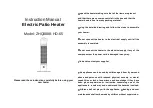
-11-
Fuel Variations
It is unlikely that the fuel you are using is the same viscosity as the fuel used to calibrate
the oil-metering valve. Diesel is one of the few fuels you can reliably get all around the
world but the quality and viscosity of that fuel is variable. Fuel differs on a routine basis
even though you buy the same oil from the same supplier. Factors influencing oil
viscosity include: the temperature; the age and quality of the fuel; the regional differences
due to local refineries; and the particular mix of certain brands of fuel.
The oil metering valve is calibrated for #2 diesel (unless requested otherwise). Burning
diesel #1 (stove oil) will allow 25% more fuel and burning kerosene will allow 50% more
fuel to flow through the oil-metering valve. Because of this, it is important to burn the
fuel for which the heater has been calibrated. Metering valves are available for diesel (D
stamp on valve), kerosene (K stamp) or stove oil, (SO). By Studying the burning
characteristics it can be determined whether the fire is too high or too low.
It is important to know that although you can re-calibrate your valve to each variation of
fuel, you can also adjust the way you operate the heater to compensate for these
variations. If the oil is thicker than usual, open the valve more or use less fan. If the fuel
is thin, run the fan more to burn off the fuel.















































